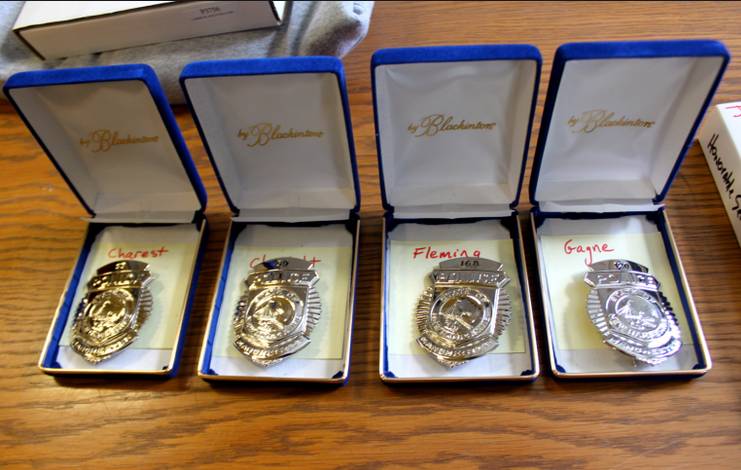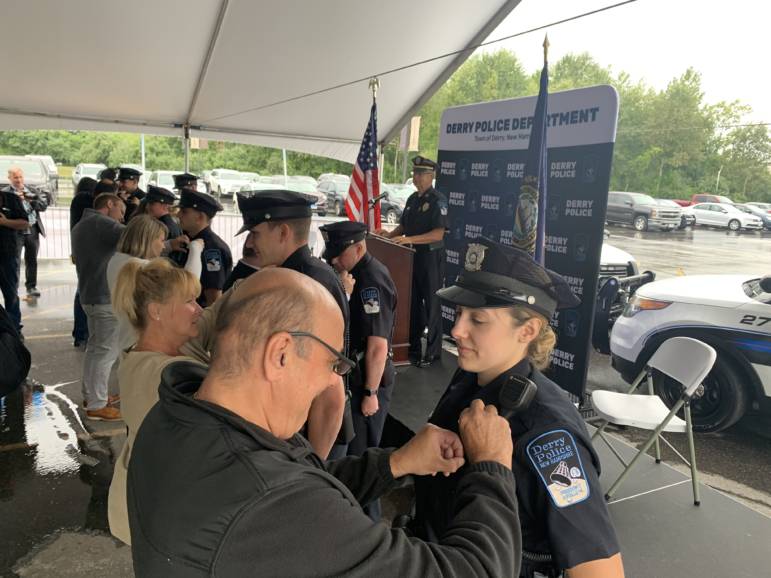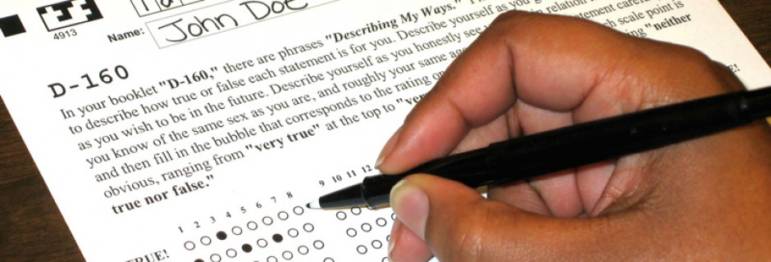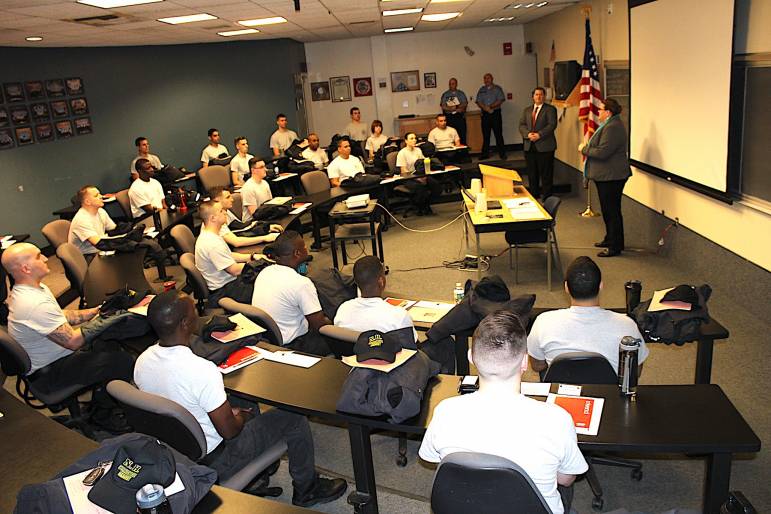
After dozens of new police applicants in New Hampshire are winnowed by a rigorous process of written tests, interviews, oral boards, polygraph tests and background checks, many prospective officers must also be psychologically evaluated before they go through the state police academy to become certified.
Hudson Police Chief Bill Avery said psych tests are one component of the process, but no less “vital” than the other screenings.
“Money is no object when it comes to specifically law enforcement and making sure we have the right person to do the job,” Avery said.
Conducting an evaluation to ensure psychological stability is considered a best practice by the International Association of Chiefs of Police (IACP) and most police departments. State law requires any full-time or part-time certified law enforcement officer in New Hampshire to “successfully pass a psychological screening test battery administered under the direction of a licensed psychologist or psychiatrist.”
The evaluations, which include a written test and sometimes an interview with a psychologist, are used to identify any significant pathologies, personality traits or mood disorders that would not be conducive to the stresses of police work, and in some cases it may even flag indicators of racism and other forms of implicit bias.
But the testing methods and results can vary significantly from one department to another and from one clinician to another, even within the state, despite the fact that the IACP provides standard guidance for psych testing for police applicants. And until a new law which took effect this summer, not all officers in New Hampshire were tested.

Inconsistencies In Testing and Reporting
The Police Standards and Training Council (PSTC) is the state agency tasked with enforcing many of the state’s statutory police standards, but a review published Aug. 31 by the New Hampshire Commission on Law Enforcement Accountability, Community and Transparency found that the council’s procedures “omitted crucial standards” such as drug and psychological screenings. Documentation to track compliance was inconsistently completed by law enforcement agencies, and went largely unaudited by the PSTC.
In other words, it’s unknown how closely departments across the state adhered to the rules requiring psych screenings. To further complicate things, a loophole in the law previously allowed for some departments to opt out of the screening if they do not have approved funding for it.
“Consequently, some law enforcement agencies within the state may have officers who have received psychological and drug screening while others may not,” the Commission’s final report states.
The Commission surveyed 108 law enforcement agencies in the state and found that 14.5 percent did not consistently require psych screening for new hires, 9.2 percent reported having at least one officer who did not undergo screening, and 5.3 percent (four agencies) said they never require psychological testing. Its review of 30 previously new cadet training files uncovered only one instance where a psychological screening was performed.
Nicole Sawyer, one of a handful of psychologists in New Hampshire who performs psychological evaluations for police candidates, said the process is inconsistent even among those departments that do regularly conduct testing, depending on who they hire to administer the tests and assess the applicants.
“It’s tremendously concerning that there isn’t a uniform standard for psych evals in New Hampshire,” she said.
Sawyer said their standards set by the IACP offer guidance on the level of information that should and shouldn’t be shared with police departments, but she said many of the state’s departments do not adhere to these guidelines because the psychologists they use do not adhere to them.
In accordance with IACP guidelines, Sawyer will share in her report symptoms and personality traits she believes will interfere with police work, but she will not go so far as to label mental disorders the candidate has or mention any past traumas the candidate tells her about.
At the same time, failing to include any information about the applicant in a psych report is also not recommended, according to the guidelines.
Some psychologists provide law enforcement agencies only generic reports that share their recommendations. Manchester-based neuropsychologist William Jamieson, who works with about 10 different departments including Manchester, Concord, Derry and Portsmouth, takes this approach to writing his reports.
“I look at my job as basically saying you should hire this person or you shouldn’t,” Jamieson said.
Getting more psychologists and departments to follow the IACP guidelines is a matter of education, Sawyer said. She said many departments are surprised to learn they can get as much information as her reports provide, after switching from psychologists who regularly provide simply a pass/fail recommendation.

Room For Improvement
In its report, the Commission included a number of recommendations for improving the psych evaluation process, including more oversight to ensure testing is happening, developing rules that set an acceptable standard for testing, and making sure every officer is undergoing required psych screening.
It also recommended ongoing testing for officers already on the job.
“I think we are going to see, as a result of those recommendations, some changes in the near future with respect to these issues,” Derry Police Capt. George Feole said.
Many of these proposed changes will require legislation. So far, ensuring universal psych testing for police candidates has already become law with the signing of this summer’s police reform bill, which also changed police misconduct reporting rules and prohibited chokeholds by police.
The law calls for the creation of a new fund to pay for psych screenings using the state’s drug forfeiture fund. The new fund has been established and the New Hampshire Police Standards and Training Council has already received its first request for reimbursement, according to Director John Scippa.
But the new law may not be enough, according to psychologists.
Sawyer said while many departments spring for a local clinician to analyze the written tests, interview candidates one-on-one and write reports for hiring agencies, other departments simply do the written assessments and outsource them to out-of-state companies for scoring.
That’s a problem, Sawyer said, because without the interview with a psychologist important topics such as a candidate’s upbringing, conflict management history, their personal relationships and motivations for becoming a cop will get overlooked, and potential issues like bias can be missed.
“That’s where the interview becomes so imperative,” Sawyer said.
In Sawyer’s experience it’s usually just smaller communities that use the mailaway testing services, but one of the larger towns that have used it for years is Salem.
Salem Human Resources Director Anne Fogarty said the town has used Psychological Resources Inc. out of Atlanta, Georgia to score its police candidate psych exams for the 16 years she’s been in the HR department..
At $150 per candidate, it is one of the least expensive options out there.
Fogarty said she would have proposed a change to the process this year, to possibly include an interview with a local psychologist, were it not for the pandemic taking up so much of her time. Next year, she expects to have a proposal ready.
“I’m definitely looking into other options,” Fogarty said.
Nashua and Hudson pay Sawyer $500 per candidate, which is on the more expensive side. Sawyer works with 20 different departments, including Merrimack, Candia, Exeter, Epping and Barnstead.
Manchester-based neuropsychologist William Jamieson said he works with about 10 different departments including Manchester, Concord, Derry and Portsmouth. Feole said Derry Police pays Jamieson $225 per candidate. Manchester pays the same, according to department spokesperson Heather Hamel.

A third clinician who has previously done testing for New Hampshire State Police and other major departments, clinical psychologist Warren Fitzgerald, was unavailable for comment this week.
Avery, the Hudson chief, said you get what you pay for. Eight to 10 months ago he switched to Sawyer from another clinician, who he declined to name, after seeing a difference in how effective Sawyer is at interviewing candidates and how detailed her reports are. Avery said she is able to have candid discussions with candidates and get them to open up about their upbringing, their early adult living, their lifestyle, and their mental wellbeing in order to give a more comprehensive picture of the candidate.
“She seems to really relate with our police candidates, or with anybody quite frankly,” Avery said.
He said evaluators could easily miss something important if a candidate isn’t interviewed effectively.
Chief Denise Roy in Merrimack echoed this. The Merrimack Police Department started sending all their candidates to Sawyer about five years ago. Prior to that, Roy said the department was inconsistent at doing psych evals.
“Before, the inconsistencies created issues with some of the people that we hired here,” Roy said.
Many of the people who spoke with the Granite State News Collaborative agreed that making clinician interviews a required part of the psych evaluation process should be a part of any statewide standardization efforts.
“We’re gonna be better off, we’re gonna get more qualified candidates if we all do the same thing,” Roy said.
But Sawyer and Jamieson did not go so far as to suggest all clinicians ought to be legally bound to use the same test.
“I think there’s always room for improvement. I think the question is how much of it is standardized and how much of it isn’t,” Jamieson said.
Different kinds of tests
Beyond catching some low-hanging fruit like textbook pathologies or serious anxiety, clinicians are on the lookout for personalities that may not fit well in a police uniform.
Sawyer said she looks for indicators of rigidity, overconfidence and a black-and-white worldview.
“Their ability to self reflect is huge,” Sawyer said.
Jamieson said he is wary of candidates who express an “authoritarian personality,” who do not possess the skills to converse with people, an interest in solving problems or are able to see both points of view in a conflict.
While many aspiring officers are current or former members of the U.S. Military, Post Traumatic Stress Disorder, a not uncommon condition among people who have served in active duty, is not an automatic disqualifier, Sawyer said.
“To simply screen out a veteran who has symptoms of PTSD based on a written assessment is to miss out on many excellent candidates,” Sawyer said.
She said an interview would help to determine if someone with PTSD is able to exercise effective coping skills, the ability to self-assess and implement proactive self care. Conversely, the interviewer could also flag candidates whose symptoms would likely interfere with their duties as an officer.
Some red flags are harder to catch, according to Sawyer, including implicit bias against ethnic minorities, women or LGBTQ individuals. Racism, after all, is not listed in the latest edition of the Diagnostic and Statistical Manual of Mental Disorders (DSM-5), which psychologists use to evaluate patients.
Sawyer said this is where one-on-one interviews and the type of test used can make a difference.
“There’s tremendous variability to our approach to the evaluations, right down to the assessment tests used and interview style and questions,” Sawyer said.
Clinicians can use a number of common tests designed to create a personality profile and screen for things like narcissistic tendencies, psychopathy, anxiety and other issues. The tests also show when an applicant is answering the questions to make themselves look “too good,” which Jamieson said could be an indicator of dishonesty or an inflated self image.
The names of these tests are an alphabet soup of acronyms; PAI (Personality Assessment Inventory), IPI2 (the Inwald Personality Inventory 2), MMPI 2 RF (the Minnesota Multiphasic Personality Inventory-2 Restructured Form), COPS-R (the Candidate and Officer Personnel Survey Revised) or M-PULSE (Matrix-Predictive Uniform Law Enforcement Selection Evaluation Inventory). Some tests are generic while others are geared specifically for police.
Jamieson uses a generic version of PAI (though a police-centric version of PAI exists), plus the M-PULSE, which is geared more for police subjects.
Sawyer said she primarily relies on the IPI2, which is similar to the PAI, but combines a series of separate mini-tests, as the PAI is structured, into a single test that looks for all the personality traits together.
This is an important distinction, Sawyer said, because the mini-tests can tip their hand to the tests-taker, who may discern what problematic tendencies are being sought out by the questions.
“When you’re hiring someone you need subtlety because they’re trying to put their best face forward,” Sawyer said.
The combined test is able to flag more inconsistencies in the answers, she said.
The PAI test is also designed for a general clinical population, so the questions assume the subject is a psychiatric patient seeking treatment, according to Sawyer.

Screening for bias
Sawyer said the tests do not directly look for bias, and no one test is necessarily better than another at finding it, but a skilled psychologist can identify behaviors and personalities that correspond to bias-related tendencies.
Both the IPI2 and the M-PULSE tests have scales that measure personality indicators that may be related to bias. But when those are flagged, clinicians like Sawyer and Jamieson may respond differently.
Sawyer said bias exists in everyone, to varying degrees. Some people adhere to stereotypes simply out of a lack of life experience and are able to adjust their perspectives with proper training.
But if, after conducting an interview, she encounters a candidate with a rigid and inflexible personality, who is not likely to shed their problematic categorizations of people, she recommends police departments not hire that individual and cites why in a detailed report.
Jamieson said when he encounters a bias flag from the test results, he conducts an interview to learn more about the candidate and what might have caused the issue to be raised in the test.
Ultimately, Jamieson is not sure why the test flags someone for bias, and doubts the tests’ accuracy some of the time.
“I think that’s a hard thing to measure, I think it’s a hard thing to get a handle on,” he said.
If he finds serious bias, Jamieson will not say so in his report to a hiring agency — he’ll only disclose his recommendation not to hire, which he trusts most departments to follow.
In the past 40 years, Capt. Feole in Derry has never seen a psych report that specifically cites bias as an issue. And in recent memory, he hasn’t seen a candidate get a negative recommendation from Jamieson.
Jamieson said most of the candidates he sees have already been pretty well vetted by the time they get to him. Over the past 35 years or more of doing this work in New Hampshire, he has only encountered a small number of candidates he could call racist or have some sort of strong bias that required a recommendation not to hire the person.
“I’ve only seen a handful, I think. I worry about that sometimes. Am I missing something here? But yea, it’s only been a handful of people,” Jamieson said.
Sawyer said she has been doing this work for 10 years and has also found “a handful.”
“I don’t think any part of the process can catch something 100 percent of time,” Salem HR Director Anne Fogarty said, adding that even the most effective screening process will be for naught if leaders in police departments across the state don’t take those recommendations from psychologists seriously.

Continuing wellness
The Commission also identified a need to offer continued mental health support for officers who have been on the job for years.
Jamieson agrees. He said the application and selection process is like a snapshot in time of what the person is like, so it should not be looked at as a one-and-done procedure.
“If you’re hired in the year 2000 to work … you’re not the same person 10 years later. The job can change you, all kinds of things can change you,” Jamieson said.
Sawyer has offered group trainings in Hudson and Merrimack for officers, civilian employees of police departments, and even family members to learn and catch early signs of stress or trauma so police officers can get the help they need early.
“Dr. Sawyer is a huge asset to my police department, not only with recruiting but with issues that come up throughout the years. And, more importantly, being proactive and looking out for our current staffing mental wellbeing,” Hudson’s Chief Avery said.
 These articles are being shared by partners in The Granite State News Collaborative. For more information visit collaborativenh.org.
These articles are being shared by partners in The Granite State News Collaborative. For more information visit collaborativenh.org.







